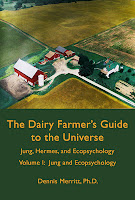Dennis L. Merritt, Ph.D.
In the famous 1957 BBC interview, C.G. Jung proclaimed, “We need more psychology, the human psyche must be studied! Humans are the source of all coming evil.”
Psychology is positioned to usher in a holistic approach to the study of the human psyche, our relationship to the environment, and a truly interdisciplinary educational system. As Jung pointed out, all we know and experience comes out of the psyche and all our systems, including science, have an archetypal base. The
merritt (4)
"Scientific study, cognitive behavioral techniques, self-help books, and political action will not do the trick. We will not achieve the fundamental level of change and understanding that is called for unless the archetypal, transcendent, sacred and mythical dimension of the psyche is engaged. The sense of the sacred Carl Sagan saw as necessary to save the environment will not be developed. Our educational systems will not be able to teach from a deep, holistic, integrated perspective unless the
 |
June 27, 2012
News Release - Just Published by Fisher King Press
The Cry of Merlin:
Jung, the Prototypical Ecopsychologist
The Dairy Farmer's Guide to the Universe Volume II
by Dennis L. Merritt
Carl Jung can be seen as the prototypical ecopsychologist. Volume II of The Dairy Farmer’s Guide to the Universe explores how Jung’s life and times created the context for the ecological nature of Jungian ideas. It is an ecopsychological exercise to delineate the many dimensions of Jung’s life that contrib
One of Jung’s biggest challenges to modern men and women from an ecopsychological perspective is to unite our cultured side with what he called “the two million-year-old man within.” The “indigenous one within” is a person living in a sacred and symbolic relationship with nature, in a world where “we are all related”—the two-leggeds, four-leggeds, six-leggeds, etc. To understand Jung’s challenge, we begin by looking at our Western indigenous roots and the evolution of th

